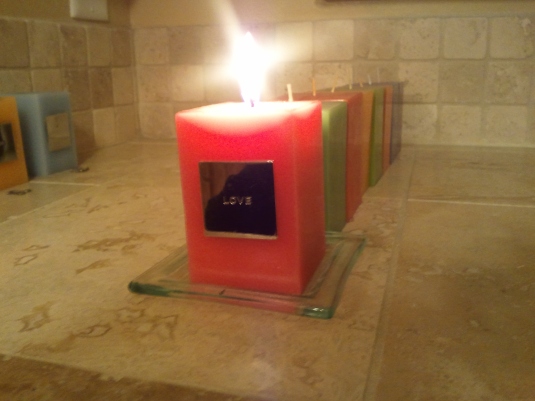 On Saturday, August 6, 2011, I woke up early. I started the coffee pot and wandered bleary-eyed out into my driveway for the paper on what promised to be a beautiful summer day. I checked the world news first.
On Saturday, August 6, 2011, I woke up early. I started the coffee pot and wandered bleary-eyed out into my driveway for the paper on what promised to be a beautiful summer day. I checked the world news first.
I always check the world news first, these days.
There wasn’t much there. Just protesters promising unrest and violent overthrow in Syria. Just angry Serbian mobs on the Kosovo border. Just Gadhafi propaganda about NATO strikes. These were my husband’s so-called “groundhog days” for the past year. These were what he referred to as the deadly “protest of the month” clubs. Uninterested already, my thoughts turned to the percolation progress of my morning medicine and I wandered back to the kitchen.
I stood impatiently and watched the slow trickle of that holy brown elixir, waiting for enough caffeine to descend into the glass pot to defend stealing an early cup. I flicked on CNN. I like the smell of news in the morning, before the kids wake up. That way I don’t have to keep my thumb poised and ready to strike the “channel up” button at the first sight of armored vehicles or gunfire reels, or bloodied bodies, or a man in a uniform that looks like their daddy.
I thought about my conversation with Sweet Pea the day before …
“Mommy, every time I see a man with brown hair, I think it’s Daddy. And then I get sad because it’s not him.”
“I know, honey. He’ll be home soon. We just have to hang in there a little while longer.”
“Okay, Mommy. I know.”
Lost in that thought I only half-heard the reporter … “It’s top of the hour and we have breaking news out of Afghanistan where it appears a chopper has been taken down with 31 Americans on board, 25 of them believed to be special operations forces.”
I looked up, shocked.
My husband is assigned to a joint special operations group, and my brain immediately and irrationally went to the deepest corners of fear that I keep hidden away. I knew my husband was not among them. He was rarely aboard choppers, and I knew he wasn’t “forward.” I knew if there was bad news, there would have been a Casualty Officer in a crisp Navy uniform and a Navy Chaplain at my front door. I knew, after years of hearing Husband’s instructions, that no news was good news. I convinced myself again by announcing “No news is good news,” in the direction of the front door.
I got a text from a friend attempting to reassure me. It was logic, and I knew it was true: HE’S AS SAFE AS A KITTEN. But I shot a hasty email to Husband anyway. I knew it would sit there in eerie silence. And it felt good to send a message to someone I expected a response from.
“Just getting word of the 31 who died. I’m sorry. Thinking of the friends and families left behind this morning.”
I sipped. And I stared. I got up for another cup.
 I slapped my cup down on the counter in anger at the war, this deployment, the newly fatherless children, and the very, very young widows. The force of my own hand surprised me as the cold gritty remains of my coffee sloshed out a little, and I stared at the spill as if leaving it there underlined my anger. It quickly gave way to sadness, and it overtook me. I covered my face and leaned down, the tears streaming quietly behind my closed hands.
I slapped my cup down on the counter in anger at the war, this deployment, the newly fatherless children, and the very, very young widows. The force of my own hand surprised me as the cold gritty remains of my coffee sloshed out a little, and I stared at the spill as if leaving it there underlined my anger. It quickly gave way to sadness, and it overtook me. I covered my face and leaned down, the tears streaming quietly behind my closed hands.
I cried.
The reporter blared in the background about the breakup of J-Lo and Marc Anthony and I thought about the irony of my military life: I live a lifestyle that supports and revolves around my husband’s needs, all the while unwittingly developing the very traits that would prepare me for a life without him. Extended separations have required me to be an independent decision-maker and solo parent. Last-minute changes have equipped me with amazing perseverance and flexibility and the ability to eliminate expectations. Moving away from family and friends has made me resourceful and capable of developing deep, meaningful friendships with people who have become a second family. As I contemplated what kind of fate I was tempting by managing to be so strong and independent, my email alert pinged. It was him. I couldn’t open the email fast enough.
The entire message read: “Not a good day for SOF.”
And I breathed. This communication was exactly the kind of understated, brief response I have come to expect from Husband, lately. My emotional deployment rollercoaster has become the yin to his yang – a barely detectable sine wave of predictable, smooth, logical expression. But as I stared at the email, two things struck me.
 First, the expression “not a good day” reminded me of the evening he came home to announce he had a “bad day at the office” after losing his canopy mid-flight. There’s something in military lingo about absurdly understated descriptors that tells you how big things really are. I guess it’s like calling an Aircraft Carrier “the boat” or hearing a servicemember describe their actions as “just doing my duty.”
First, the expression “not a good day” reminded me of the evening he came home to announce he had a “bad day at the office” after losing his canopy mid-flight. There’s something in military lingo about absurdly understated descriptors that tells you how big things really are. I guess it’s like calling an Aircraft Carrier “the boat” or hearing a servicemember describe their actions as “just doing my duty.”
Second, the brevity reminded me of the day Husband called to say “I won’t be home until late. I love you.” As the hours pressed on, the news told me that someone in his squadron had gone into the water, and I knew right away that it wasn’t him. He had communicated that he was not involved.
So whether he intended it or not, this six-word email gave me peace. Logic and training and pre-deployment talks prepared my brain. But the receipt of this six-word email was what my heart really needed to hear in order to start beating again.
This is the blunt pounding wave part of being a military spouse. News of death causes things I’ve put in the back of my mind and heart to become momentarily feasible. Despite what I know is actually true, crushing waves of irrational possibility remind me what Husband is sacrificing. What I’m sacrificing. What my children are sacrificing. The whitewater tumbles me upside down and tosses me to and fro in an indolent tide until I smack the sandy bottom, get my bearings, and manage to come up for a gasp of air. This time, I recovered quickly thanks to a well-timed email.
My husband is in a relatively safe location, and I generally don’t worry about his physical safety. But this grit on my skin … this thin salty haze that seems to have been left behind by my tussle with that wave … I just can’t seem to wash it away. And I have a feeling it’s sticking around for a while.




